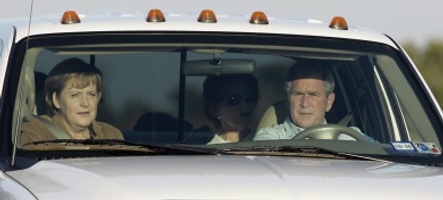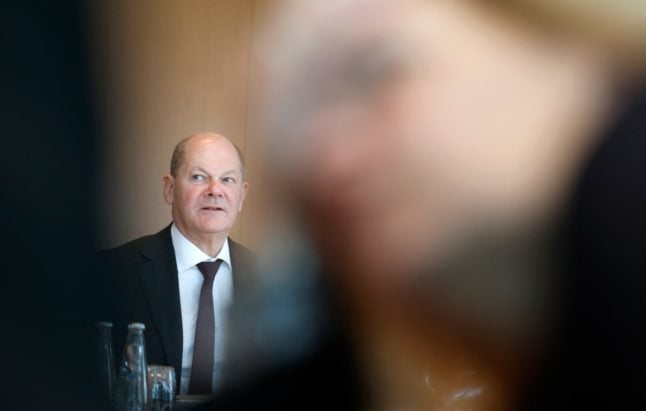If there is one issue on which the three remaining US presidential candidates seem to agree, it would be the need to repair relations with key allies, badly damaged by the Bush administration’s toxic combination of arrogance and ineptitude. As easy a task as this might seem from the perspective of the campaign trail in Iowa or Indiana or even Puerto Rico, the tricky reality is that moving beyond the jagged wreckage of the Bush years in US-European relations – and US-German relations – could prove surprisingly challenging, regardless of which party wins in November.
That is not to say there will not be fine flourishes of photo-op diplomacy early in the next administration that will inspire all sorts of commentary heralding the dawn of a new era in US-European relations. It would be surprising, for example, if the next US president does not come to Berlin and give a stirring oration near the Brandenburg Gate, riffing on both Kennedy’s “Ich bin ein Berliner!” speech and Reagan’s “Mr. Gorbachev, tear down this wall!” moment, all on the way to marking the 20th anniversary of the fall of the wall next November. Such a speech would likely earn rave reviews from a German media and public thrilled that Bush has finally been put out to pasture on his Texan faux ranch.
German Chancellor Angela Merkel has made political hay of just such a rhetorical embrace, self-consciously contrasting her own Bush-friendly approach (she even visited the ranch) with predecessor Gerhard Schröder’s alleged opportunistic anti-Americanism. Even so, Merkel has held firm in the face of aggressive taunts from US Secretary of Defence Robert Gates and others in Washington that Germany is not pulling its weight in Afghanistan. Despite strong US pressure, Merkel has so far refused to send more troops or redeploy German soldiers to more dangerous southern parts of Afghanistan. She and others in Europe are finding it easy to say no to the US with the Bush administration drained of credibility and clout, and it’s fair to ask if this practice at ignoring US pressure might outlast the Bush years.
We may have to wait for the various Bush-era memoirs for any real clue as to what the President was thinking with his reverie over seeing into Vladimir Putin’s soul. Here’s an early guess that some sort of pharmacological miscalculation may have played a role. Regardless, Bush may have done us all a favour by helping discredit the politics of male bonding. Bush gave up much by drastically personalizing US-Russians and gained little, except a self-imposed paralysis in the face of Putin’s cheerful contempt for democracy. The same could be said for Berlin’s ties to Moscow under Schröder, who was even chummier with his good buddy Vladimir. But at least Bush isn’t likely to start working for Gazprom come next January.
Ironically, the Bush administration took office talking up the dangers of just such a personalization of politics. In an interview in late 1999 for the Berliner Zeitung, Condoleezza Rice told me that her top critique of Clinton administration policy toward Russia was the extent to which it had personalized US-Russian relations. Rather than acting on that critique, the Bush administration took personalization to new extremes with Russia and yet, in dealing with Germany, Bush was so frosty to Schröder even from the outset of their relations that at least according to New York Times columnist Maureen Dowd, the former Chancellor left his first White House meeting with Bush wondering if the President even knew his name.
Relying on such short-cut diplomatic approaches as a grinning photo op with a foreign leader indicates an administration that has failed to grasp the core reason for wanting robust relations with our key allies like Germany and the rest of Europe: It’s the self-interest of the US administration to have allies who can work together on world priorities, yes, but also that can serve as a check on some of the more unfortunate impulses of the world’s lone superpower by objecting to policies that seem unwise and possibly disastrous. The test of the next president’s relations with key European allies will not be the photo ops, but success in articulating a world view – and policies – that are based on a commitment to genuine give-and take, not merely a mix of grudging compromises and largely empty feel-good initiatives.
John McCain offered a good example of the limits of mere atmospherics when he showed up at Élysée Palace in Paris this March for a back-slapping session with Nicholas Sarkozy. The only problem was, McCain fouled up the whole trip with his now famous insistence that Iran was arming and training Al Qaida in Iraq. The repeated misstatement reminded Europe that a McCain administration would represent four more years of US policy in Iraq completely detached from reality. Meanwhile, the Republican Senator from Arizona had to back away from his call for a “League of Democracies,” an obvious bid to undermine the United Nations, because of the cool reception the notion was getting in Europe.
If a Democrat wins, enormous obstacles to revived relations will still remain, starting with the likely need – regardless of campaign rhetoric – to leave a significant if reduced US force in Iraq for many years to come. Continuing frictions over Afghanistan and a variety of other issues are also likely with a Democratic president under strong pressure at home not to appear to be too accommodating of European wishes.
“No matter who is the next president, this issue (Afghanistan) is not going to go away,” said Thomas Risse, director of the Centre for Transnational Relations, Foreign and Security Policy at Berlin’s Free University. “I think there are some illusions in Germany that the first thing a new Democratic president would do would be to No. 1 sign the Kyoto protocol and No. 2 sign the World Court. There are a lot of hopes that are unlikely to be met.”
Steve Kettmann is an American author and journalist in Berlin. His latest book <a href="http://www.amazon.com/Letter-New-President-Commonsense-Lessons/dp/0312383029/ref=sr_1_4?ie=UTF8&s=books&qid=1211137746&sr=1-4
” target=”_blank”>Letter to a New President, co-written with Senator Robert Byrd of West Virginia, is due out in June from St. Martin’s/Thomas Dunne Books.



 Please whitelist us to continue reading.
Please whitelist us to continue reading.